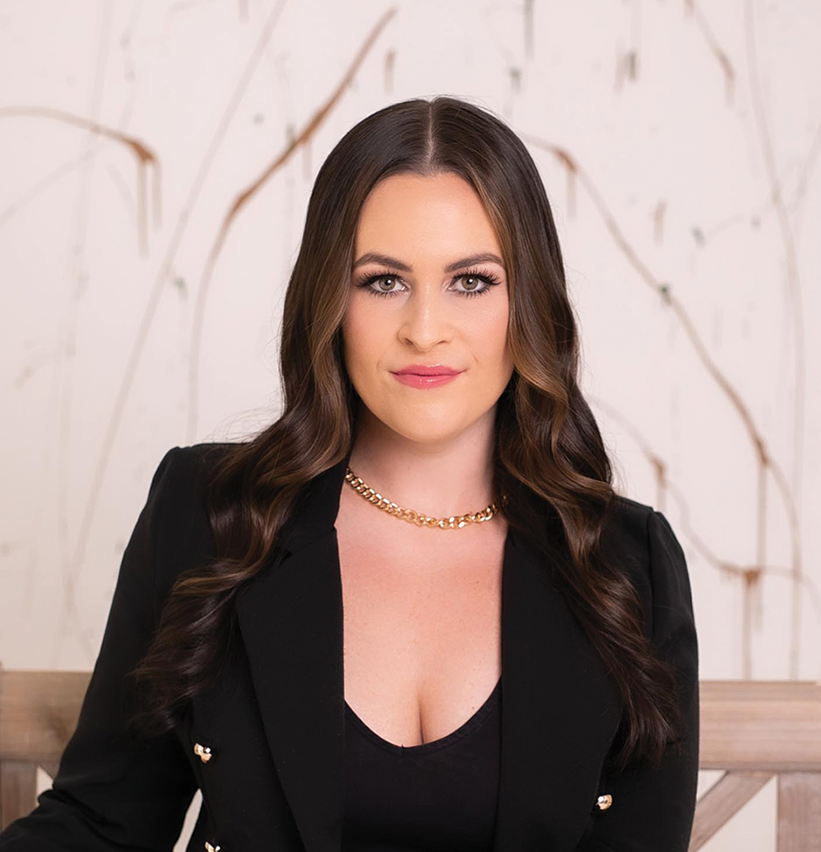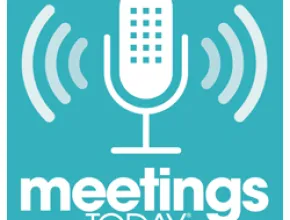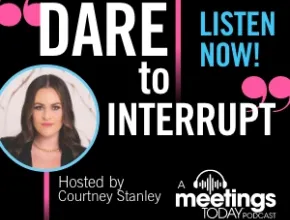Stop Trying to Be the Hero(ine): The Complexities of Having It All
Season 3, Episode 11
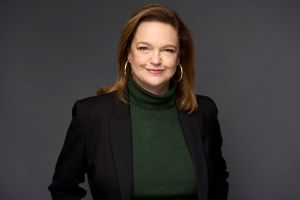
Guest: Kelley Douglass, Director of Client Services, Agenda: USA
As we're trying to keep up with the comeback of the events industry, are we setting ourselves up to fail? Kelley Douglass, director of client services at Agenda: USA, discusses setting boundaries to prevent burnout, her personal experience with battling depression, and the complexities that come with trying to be everything to everyone.
Want to hear more from Courtney and her incredible guests? Find all Dare to Interrupt episodes here.
[Listen to the previous Dare to Interrupt podcast: Live Out Loud: Owning Who You Are, as Defined by You]
Meet Our Guest:
Kelley Douglass prides herself on being authentic. As a veteran of both the ad agency and events industries, she's worked with major national brands to produce events large and small. One of her favorite things to do is curate one-of-kind experiences and watch the faces of her guests as they are making memories. She has worked in the destination management and supplier side of the hospitality business in both New Orleans and Kansas City. She has been married for 30 years (most of them happily) and has four grown children.
Connect with Kelley:
LinkedIn
Website
More About Our Host:
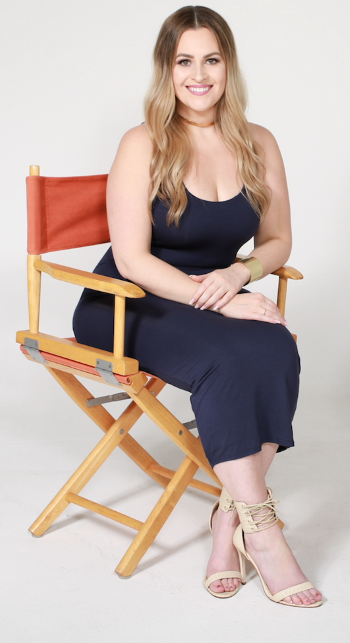
Courtney believes that transforming past experiences into impactful conversations through raw, authentic storytelling challenges the status quo, connects people from all walks of life and results in great change for the world.
- Courtney is the youngest member to have ever been elected to Meeting Professionals International’s (MPI) International Board of Directors
- She is the recipient of Smart Meetings’ Entrepreneur Award, MeetingsNet’s Changemaker Award, the Association for Women in Events (AWE) Disruptor Award, the MPI Chairman’s Award and MPI RISE Award.
- Named Collaborate and Connect Magazine’s 40 under 40 and a Meetings Today Trendsetter.
- Recognized as one of the event industry’s most impactful change-makers.
- Serves on the Events Industry Sexual Harassment Task Force, AWE’s Board of Directors, MPI’s Women’s Advisory Board, is a Meetings Mean Business Ambassador and is the co-founder of the award-winning movement, #MeetingsToo.
- Named as a 2020 Meetings Trendsetter by Meetings Today
Connect with Courtney:
Transcript:
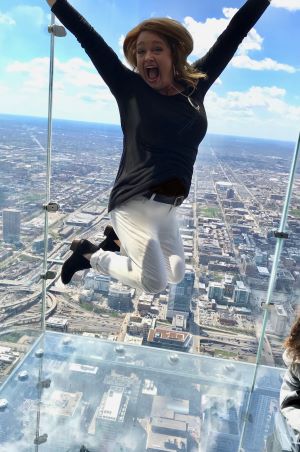
Courtney Stanley: Hello, everybody. This is Courtney Stanley and welcome to another exciting episode of Dare to Interrupt, a listening experience where you have the opportunity to sit in on honest, unfiltered conversations with women who are considered to be the most influential, inspiring and innovative leaders in the world of events, hospitality, business and beyond.
Throughout their careers, these leaders have dared to interrupt conversations, their own comfort zones, and sometimes even societal norms to hustle toward their greatest levels of success. I'm so excited to introduce you to today's guest here with us. We have Kelley Douglass, director of client services at Agenda USA. Kelly, it's so great to have you on the podcast. Where are you joining us from today?
Kelley Douglass: Good morning, Courtney. Thank you for having me. I am coming to you from Kansas City, Missouri. Kansas City actually is both in Missouri and Kansas, which people don't understand. There’s literally--the city is split down the middle. And it's in two different states. So, hi. And I work in Kansas.
Courtney: So yeah, that is fascinating. I knew that there were two Kansas Cities, but technically, it's the same city just split down the middle...
Kelley: It's the same metropolitan area. It's just split down the middle into two different states.
Courtney: How strange? I wonder if that'll ever change. I wonder if one state will decide to just make it a completely new city at some point? I don't know.
Kelley: I don't know either. Yeah, I don't know who thought that was a great idea when they did that.
Courtney: I don't know either. I'm going to have to look it up. That's interesting. Well, I've already learned something new today. Thanks, Kelly.
Kelley: There's your nugget for today?
Courtney: Well, it's really great to have you here. I've loved getting to know you over these past few months, both in person, now, and through our conversations virtually. And I think you have such an interesting story. And I think you have a lot to share.
So, this is going to be a conversation that I look forward to sharing with our audience. And you truly have such a robust career, from the time that you spent in advertising to working on so many different types of events, including the Super Bowl--which is super, super fun--to managing events and sales and operations in the DMC world.
So, you've seen the events, hospitality and tourism industry go through a lot of ups and downs, especially over these past couple of years. What's your take on the state of our industry? And what's happening in our community today?
Kelley: Yeah, um, a little bit of background about me. I haven't always lived in Kansas City. I've done events and ad agency work and other places throughout the United States. So, I have a little bit of a broader perspective. And I think the state...what's going on right now...I'm really afraid that we've missed an opportunity.
During COVID, we all had this opportunity to push the reset button, right? And so, our industry came to a standstill. And we all got some really intense personal time that we had maybe ignored before. And I feel like when events came back, we were so excited about our industry coming back, and so excited about events coming back, and a lot of us are "Type A" personalities, and we get energy from being busy. And we're in the service industry, right? So, we want to serve our clients. And I feel like we jumped back in and forgot to set boundaries. And we were just so thankful to be back at work that we jumped in with both feet.
And we forgot all the lessons that we learned personally during COVID. And it's like I see planners running toward a fire, and I just want to yell, "Stop, stop, stop!" I'm really afraid that six months from now we're going to have another great exodus from burned out planners in our field. I'm on the supplier side now. I run a DMC and I see it in the DMC world. I see it in the vendor [world] and my vendors. They're all just [unintelligible], grateful for the work, but they're not sleeping, they're working all weekend, they have no personal time.
You know, it's just like we've forgotten all of the lessons that we promised ourselves we wouldn't. And I just want to encourage people to take a step back and not be afraid to set some boundaries and to say, you know, I'm not gonna be able to get that to you today. Or that project's not a particularly good fit for us right now, I'll be happy to refer you out to someone else. Or, of course, I can get that for you, but I'll be able to do that in three days.
You know, I think we have to have enough confidence in our value and what we bring to the table and our knowledge base that we realize we're the experts and our clients do want us as the experts. But we're not at their beck and call. We need to be able to draw some boundaries for ourselves and our mental health.
Courtney: I definitely agree with everything that you're saying. And that leads me to the question, why do you think we struggle with setting these boundaries?
Kelley: Well, I think being in the hospitality industry, where customer service is first, right? Like, the customer's always right, and we’re also type A--most of us are type A, we love exceeding expectations, right? We love being the hero. Well, now, like yesterday, I led a brain day with a group of people called "Quit Being the Hero." We have to get over the fact that we want to be the hero. It's okay not to be the hero, it's okay to do a good job, and still do quality work, but not burn yourself out in the process.
Courtney: So, talk to me about the brain date that you facilitated yesterday. What were you hearing from the other people in your group? What was their feedback? What did you share with them that you felt like maybe was a message or an idea that they connected with, felt validated by learned from? I'd love to hear more about that.
Kelley: Yes. So, we all want to get back to setting these boundaries, and some of us are better than others. And really, it comes from the top of your company, right? Whether they support you having some mental health days and being able to set those boundaries for yourself and not being on call 24/7 or during the weekend. It comes from the top down. But assuming that you have decided I'm going to put these things in place, and I'm not going to answer my phone after five if I don't have a pressing matter or event. There's a lot of guilt. There's a lot of guilt. And we talked through how to deal with that guilt.
And where does that guilt come from? And, you know, we feel like if I'm not being the martyr, and if I'm not absolutely stepping over myself in customer service, or in hospitality with my clients, that I'm not serving them well. And that's just not true. So, I heard somebody say once that you should talk to yourself, don't listen to yourself.
So, I think we have to constantly remind ourselves of our value of what we do bring to the table and be confident in that and not feel guilty about saying no, or you know, restructuring our mindset.
Courtney: Yeah, I think it's interesting that you use the word guilt, and the word that came to mind as well for me was shame. You know, like feeling ashamed of not being all things to all people at all times. And I think that's where we often get in trouble, is trying to meet the expectations and needs of those around us instead of being able to prioritize what we actually need in our life to stay healthy and to stay balanced.
And as people have been using, all over the place these days, mentally fit is one of the words that that some people in our industry are using, which I think is great. For me, I tend to always come back to the idea that you can't pour from an empty cup.
And that became really apparent to me, especially during the pandemic, when I started my business as a full-time speaker and emcee in the beginning of 2020. It was obviously a disaster. With everything falling apart, my world falling apart, my plan falling apart, my plan B falling apart. And I was really left feeling confused, directionless, unfocused, depressed. And I remember having a moment one day where I realized that, even if I were to create a plan C and try to navigate my way forward, to survive as a first-year business owner, I would not be able to do that if I didn't have the energy to.
And so, I had to be able to figure out how to best support my mental health before I was able to go out and try to rebuild my business and serve the people around me. And so that notion of not being able to pour from an empty cup became very meaningful. And it truly became, I think, probably the foundation and really the catalyst for me being able to move forward and to make progress and to be, most importantly, a healthier version of myself.
Kelley: So, when you are operating out of--we're gonna say guilt, or shame, which leads to anxiety, right? And I had this moment the other day, and I was really feeling anxious. And I asked myself, "Why am I feeling anxious? Because I'm really feeling like I'm not living up to my potential. I fear I'm not having an impact. I'm not making an impact." And is that true? No, I've made an impact in my career and in my personal life.
So again, just reminding yourself of the truth and of the facts, and not letting yourself spin into, you know, the dark place. There was a lot of talk about, so what does impact look like? To you? You know, it's for some people, it's accolades. For some people, it's a successful marriage. For some people, it's working for the right company, it depends on what that is. But you're still going to get those things, the path to get there might just take a little longer or look a little different than you thought.
And that leads me to sort of the history of my career, which I want to share with people because one of the great lessons in my life that I've learned is that you can have it all. And as a woman, and I grew up in the '80s, and I don't know if you remember, Courtney, you don't you're too young, but...
Courtney:...I was born in the '80s....
Kelley: And you certainly don't remember, there was a commercial for the Enjoli woman. And she could bring home the bacon, fry it up in a pan, and never, never let him forget he's the man--like she literally was doing it all. And there was this magazine ad where, you know, she was coming home from work, she was making dinner, she was making her husband happy, the kids were at her ankles--you know, like she had it all. And I grew up thinking that was a goal and that that was attainable. And that is a lie. That is just a lie.
You can have all those things--I have had a great career, but I've also been married almost 30 years. And I'm a mom of four. And now they're grown and they're out of the house. But when I worked full time and had a nanny at home until I got pregnant with number three, and at that point, the nanny was more expensive than my salary so it came down to a logistics conversation, and it became evident that, for this phase of my life, I needed to be a stay-at-home mom, and I needed to leave the rat race, jump off the wheel and be a mom for a while.
And it was hard. It was actually the hardest thing I've ever had to do, because I never pictured myself being a stay-at-home mom, and putting so much emphasis on finding my value and my career. It really was--it was crippling, for me. At the end of that time, I actually went through a very serious clinical depression, which in retrospect, was the greatest and the worst thing that's ever happened to me, right? Like, I wouldn't want to go through it again, but it was actually really great because I was able to be honest with myself about where I was finding my value and what I needed out of my marriage or out of a future career. Looking back on it, it taught me so many great lessons.
But I think...do I regret staying at home? I took eight years off. Okay, so it was eight years, so almost a decade, I stepped away from my career. Do I regret it? No. My four children are awesome human beings. They are all independent, they're smart. They've got careers ahead of them, they've chosen well. I would never regret the time that I poured into them.
But I would not have said that in the midst of it. It was incredibly hard. There were a lot of days that ended with me crying. But I was able to--I should say as an event professional--while I was home with them, I chaired every gala, every fundraiser, every student activity, every field day, you know, I chaired all the things, okay? Because that's just my skill set. And they found out I could do it, and that's what happened. So, it wasn't like I was sitting at home doing nothing--and with four kids you are never doing nothing.
But, you know, in 2008, I was chairing a particularly large fundraiser, and it was doing really well, when someone turned around to me and said, you know, you can get paid for this, right? And it was like a light bulb went off in my brain. And I said, "What do you mean?" And that was my intro into the events industry. And I went to work as onsite staff for a DMC in New Orleans, and the rest is history. I fell in love with it. I feel like you either have that event gene or you don't. And if you have it, you're not happy doing anything else.
So, I love being in this industry. I've now worked as an independent planner, on the supplier side, on the planner side, and now I'm in the DMC world. So, I've kind of seen it from all perspectives now.
Courtney: Yeah. First of all, I really appreciate your openness and willingness to be vulnerable with your story, especially given you've said that this has been the most painful experience that you have had in your life. So, it takes a lot of courage to share that story with anybody. And I do think I agree that the more that we're able to be vulnerable and risk that emotional exposure in hopes of maybe supporting somebody else, or allowing them to feel seen and heard, I think the better our world is. So, I really appreciate that.
Kelley: No problem. I think I've just come to a point where I realize what I went through should serve a greater purpose. And that is bigger than me being embarrassed or ashamed or whatever. It was a huge learning experience. But also, I came out on the other side realizing that there are probably a lot of young moms in particular that are trying to keep it all together in the working world, and it is quite literally the hardest thing I've ever been through.
And I want to give women permission to say, "I don't like this," without judgment that you don't like your kids or you're not happy in your marriage or--there's no judgement, the freedom to say, "I don't like this. This is not working for me." Okay. Well, that's the first step. Let's talk about that. And I just want to be a safe place for younger women to be able to be honest.
Courtney: Hmm. Kelly, is that is that how the end of that chapter was for you? Where you decided to say, "I don't like this, and something needs to change?" How did that chapter evolve into something else?
Kelley: Yes. So, when the baby got into school, I realized, okay, everybody's gone from basically eight to three. I can make this work. For a career, it's time for me to go back. But also, you know, it was a conversation with an advisor who was sitting with my husband and I, and he looked at my husband and said, "Whatever she says needs to change needs to change." And my husband heard that. And we went about the conversation of what does this look like. And what those changes would be and, you know, one of them was him being home by six every night, and he did the bath and bedtime for the kids every night, just so if I was off duty at six o'clock, I knew I could be.
And also, part of that was yes, I'm going back to work, and once they all get in school, that's the agreement, I'm going back to work. So that was sort of the transition. And there have been adjustments along the way. Of course, I've worked as an independent planner for a while so that I could be available during those middle school busy times when everybody needs to be, you know, 100 different places from three to five. But there are things that you can do in this field that will work for whatever phase of life that you're in.
And I feel like after COVID, with remote work, is that is an incredible opportunity for women in this industry. To be able to do multiple things at once, to be able to... I wish that was around when I was a young mom. Remote was not an option, as I sit here in my office, like I'm still an office person. But I just want women to know that you absolutely can have it all, but it's just not going to look like what you what you think it's going to look like.
Courtney: Do you think that you can have it all in one moment? I think that's where people get caught up on this idea of you can have it all. That means that you're accomplishing everything and you're basically climbing the mountain, you're standing at the top and you say, "Look at everything that I have accomplished--all of these goals--and I've gotten everything that I wanted."
Do you think that happens in that one mountaintop moment? Or do you think that it happens in different ways throughout the years, and maybe one year you're accomplishing really crazy awesome things in your career, but then, you know, six years later, you have decided to have kids? You've checked that box, but you've got to put your career on the backburner.
Talk to me more about the idea of having it all, because honestly, Kelly, I feel like I hear a lot of people saying we need to get rid of that expression and strip that myth from the table because it's not possible for you to have it all. So, I want to dig into that more and understand what you mean by that and what that would look like.
Kelley: Yes. So, there are moments in each phase where you do have a mountaintop moment. I was recently part of a team that won a Rise Award. Well, that's definitely a mountaintop moment. When my child came home with straight A's, that was another different type of mountaintop moment. When my husband and I celebrated 25 years married, that was a different type of mountain.
So, not all of those things are going to happen at the same time. I feel like you just have to remember those times and know that they have all happened. So, cumulatively, you have had success. But is there one moment where you're going to experience it all at the same time? No, I don't believe so.
Courtney: Yeah, I would agree with that, Kelly. And I do think that sometimes, especially, people like us who are a bit type A. Yeah, I feel like I'm like an A-minus. I'm not quite the ultra-A type personality, but I certainly have A-type tendencies. I think it's important to also recognize that not everything is going to work out the way that you thought it would in the beginning.
I would actually say quite the opposite, that if you think that everything's going to work out the way that you dreamed it would at age 12, buckle up, sister, because it's going to be a whole different ride when you're in your 20s, then you're in your 30s and 40s. And beyond that life is probably going to look quite different than what you had once dreamed and hoped that it would.
So, I think even the idea of having it all or you know, accomplishing all the different dreams that you have, the goals that you have, those dreams and goals will shift
Kelley: They change over time as you mature, as you sort of hone in on an area or a specialty or a particular passion. They change. So, you know, there's a saying that says if you want to make God laugh, tell him your plans. Right? It's not going to look like you think and that is okay.
My faith is an important part of who I am, but that fades, that somebody else bigger than me is running the show really gives me a lot of comfort.
Courtney: Yeah, yeah, yeah. And I'm a firm believer in everything happening the way that it should. And, of course, that I'm not excusing any of the really terribly traumatic things that happen in life. But I do think that in the end, everything serves a purpose. I think, you know, looking back, hindsight is always 20/20. And it's easier to find those silver linings and those life lessons if you do take a moment to actually reflect and look back on the path that was forged, instead of thinking about the path that wasn't
Kelley: Yes, yeah. Amen. Amen. Amen.
Courtney: So Kelly, if you were to try to summarize some of the top line takeaways that you had in that really difficult experience in your life, what would be some of those key life lessons, silver linings takeaways that you feel like have been really instrumental and important to you as you move forward?
Kelley: I think the first thing that comes to mind is the word "should" is a curse word. Just remove it from your vocabulary. Who says you should? Why are you telling yourself you should have done this by now? You know what you should do? You should be believable. Who says your journey is going to look different than everyone else's. And just because someone else has a journey that you think you want, that's not going to look the same for you.
So, I feel like when you put should in the conversation, you're just putting expectations on yourself. They're gonna frustrate you. You know, you can have goals and you can have intentions, and they give you something to work towards. But you should never listen to me. But if you just take out the expectations that others put on you, or that even you put on yourself--because I'm harder on myself than anybody else.
So, I think taking the word should out of the conversation, even if it's in your own head.
Courtney: I really liked that advice. And I think even trying to find opportunities to combat the shoulds in your life could be really beneficial. So, I love going through exercises with some of my coaching clients where we talk about the inner critic and struggling with impostor syndrome. And a lot of times imposter syndrome comes with the word should, or I'm not good enough, or I don't belong here. Yeah, exactly.
And so, I love finding or creating opportunities to be able to dialogue with your inner critic, when you have those moments of. "Gosh, I should be making so much more money by now. Gosh, I should have a bigger title, or I should be married by now. Why don't I have kids yet?" These are also things for myself.
So, I think finding those or identifying those opportunities to push back and say, "Really, who says exactly?"
Kelley: No purpose--no positive purpose--nothing good can come from that when you say those things to yourself.
Courtney: Yeah. And I think also asking yourself the question, "Where's this coming from?" Like, is this coming from an expectation that was put on me at a young age to be at a certain place by now? Is this coming from an expectation that my community, I'm putting on myself, because I'm seeing my community has accomplished all of these things and I have not?
So, yeah, I think these are really good reflective opportunities. And you know, I know you listen to the previous episode of Dare to Interrupt where Zoe Moore and I talked a lot about body confidence and body image issues and our personal struggles when we look in the mirror, or we compare ourselves to others on social media.
And I did some things. So, you know, I'm moving into a new place in Detroit, I've spent the past few weeks, couple months, building my home, I actually made the decision to put a massive framed piece of art in my bathroom that has Maya Angelou's phenomenal woman poem.
And originally, I was like, I'm gonna put this by my desk, this is one of my favorite works of art, I feel like I really identify with the words that she uses in this poem. And instead of putting it in a place where I'm already feeling confident and comfortable, I put it in a place where I don't feel as confident and comfortable. And if my inner critic comes out, it's when I'm looking in the mirror. And so, I wanted to take that opportunity of a moment where I say, or I start to compare or feel less than, and turn it in into an opportunity of reflection and re-centering?
Kelley: Yes, yes, absolutely. That's a perfect example. And I feel like women are so much harder on themselves. Are men having this conversation with themselves? No, no, they are not. Let's just be honest. No, they are not. So, we're just like in our heads, comparing ourselves to these unrealistic expectations and examples. And we're just really being way too hard on ourselves.
Courtney: Yeah, I think so, too. I think if there's any piece of advice that I would give fellow women in my community or to anybody at all, any woman in the world, it would be to give yourself grace, to love yourself fully. I think that's something that I just think a lot of women struggle with, to be able to accept and love who you are in today's chapter.
Kelley: Yes. And that also, when you can come to that place of knowing that you are loved knowing that you are valuable, knowing that you do bring something to the table, it takes you out of the comparison game.
Okay, so when you walk into an MPI meeting by yourself, right, and you see a roomful of people, you instantly want to compare yourself to, oh, there's, there's so and so or, "Wow, she looks great." Or, "Oh, yeah, she just landed that big job or whatever." Stop it. What you have to realize is you bring something to the room as well. And what you bring is valuable. And it's a gift, and it's part of the greater picture. And you're needed.
It's exhausting to pretend, by the way, so let's all just be authentic and encouraging and just be ourselves and bring our best selves to the table.
Courtney: I agree, and considering the level of exhaustion that already exists in our industry, let's save ourselves some time. Yeah. Well Kelly, it's been great to be able to hear more about your story and the lessons that you've learned. I'd love to give you an opportunity to share one final piece of advice with the women listening in our audience today and leave them some lasting words to think about as they go through the rest of their week.
Kelley: Yeah, so there's a couple of things we've already touched on. I realize that you can have it all, just not at the same time--it's going to look different. It's going to be a cumulative picture, not a snapshot picture. And I think one thing that's been really valuable for me is realizing that there's plenty of business to go around.
So, you don't need to be competitive or bring down other people, particularly women, to win or to get ahead. It will take you much further to be kind and encouraging, and supportive, and a teammate with other women.
And that's my goal, is stop, you know, to help people stop comparing themselves to others, because you don't know what's going on with people. You don't know how they got there. You don't know their story. And just get about the business of writing your own story.
Courtney: I love that. Be about the business of writing your own story. I think that's great advice. Thank you so much, Kelly, for sharing all of your insight and knowledge with the audience today. And of course, thank you all for listening.
Share what you learned from this episode with me on Twitter, Facebook and Instagram by following at @MeetingsToday and me at @CourtneyOnstage, and be sure to never miss an episode by subscribing to Dare to Interrupt on Apple podcasts, Spotify, Stitcher, Google podcasts, and more.
Be bold. Love yourselves and keep daring to interrupt my friends. Until next time.


